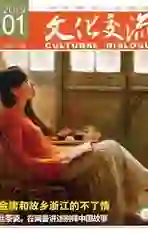Zhejiang in Jin Yong’s Wuxia World
2019-01-11LiuHui
Liu Hui

云松书舍正门 The fa?ade of Yun Song Estate in Hangzhou
Louis Cha Leung-yung, one of the most influential Chinese novelists, and better known by his pen name, Jin Yong, died in Hong Kong Sanatorium and Hospital on October 30, 2018, at the age of 94. Born in the scholarly Zha clan of Haining as the second of the six children of Zha Shuqing, who received western education, Jin Yong spent his primary and middle schooling years in Haining, Yuhang, Linan, Lishui and Quzhou. Although he rose to the summit of his fame as a novelist in Hong Kong, Zhejiang remained an important part of his subconscious. Starting in the 1990s, Jin Yong revisited what he called the “homeland” multiple times, leaving footprints in many places across the province.
On the morning of a sunny, early autumn day in 2008, 84-year-old Jin Yong, in formal attire, appeared at the foundation stone laying ceremony of the Jin Yong Academy in Haining. Behind his glasses was an amiable smile. “I have just finished the revising of several of my works, and I am open to suggestions and criticism. Ill take down notes for use in my future revision,” Jin Yong said at the ceremony. The novelists wife, Lin Leyi, also attended the “2008 Jin Yong Novels International Seminar”, which was held in the afternoon.
Jin Yongs 14 works, written between 1955 and 1972, not only earned him a reputation as one of the greatest and most popular wuxia writers ever but also paved the way for the wuxia film production boom of Hong Kong as well as the Chinese Mainland. His works show a great amount of respect and approval for traditional Chinese values, especially Confucian ideals such as the proper relationship between ruler and subject, parent and child, elder sibling and younger sibling, and (particularly strongly, due to the wuxia nature of his novels), between master and apprentice, and among fellow apprentices. The cultural value of his wuxia works is summarized at the seminar by Peking University professor Yan Jiayan as “the best representation of a cultured man”. However, what is considered by his followers and critics as “essence of culture” is, in the eye of Jin Yong, “far from extraordinary”.

金庸就讀于省立衢州中学的学籍卡 (第 3936 号)Jin Yongs student registration card at Quzhou Middle School
“Lu Xun once said it took fifty times of revision to make a good novel; and by this standard, I am far from reaching the goal, and that is why I always value criticism from all my readers,” Jin Yong shared his modesty with the audience.
The Jin Yong Academy is a remake of Anlan Academy, originally located in Yanguan and first built by Ruan Yuan (1764-1849) during the reign of Emperor Jiaqing of the Qing dynasty. The Zha family was one of the donors of the school. The new academy named after Jin Yong serves as a venue for academic communication as well as exhibition. The courtyard estate, elegantly decorated, is also a library that displays a huge collection of items showing the lifetime achievements of Jin Yong.
The novelists bond with Zhejiang is recorded by a “letter of assurance” signed between Jin Yong and the Southeast Daily in 1946, when Jin Yong joined the newspaper as a field reporter. Another interesting exhibit at the Zhejiang Archive is a resignation letter written by Jin Yong on October 6, 1947.
Born into a wealthy, scholarly family, Cha was an avid reader of literature from an early age. He was admitted to Jiaxing High School in 1936, and showed his unusual writing talent when during his years at the junior high school in Hangzhou. His first published book was a reference book he wrote jointly with his classmates in his third year at junior high school. It was also during that time that he contributed actively to a dozen newspapers and periodicals and demonstrated his sharp, chivalry-style thoughts. He started his career in journalism as reporter for the Southeast Daily in 1946.

東南日报社职工登记表(浙江省档案馆藏)Jin Yongs registration form filled out when he was employed by Southeast Daily, courtesy of Zhejiang Archives
Southeast Daily produced an army of distinguished newspapermen, including Hu Jianzhong, Wang Yuanhan, and Zhang Huijian. It merged into Zhejiang Daily after the liberation of Hangzhou in 1949. He later honed his journalism skills at the Hong Kong headquarters of Ta Kung Pao and at the newspapers Shanghai office, and joined Hsin Wan Pao as a translator and editor. He co-founded the Hong Kong daily newspaper Ming Pao in 1959 and served as its first editor-in-chief for years. He was also the founder of the newspapers weekly and monthly offshoots, and co-founded Shin Min Daily News, a Singapore Chinese-language afternoon newspaper, first started on March 18, 1967 as an offshoot of Ming Pao.
In , Jin Yong penned more words than necessary to depict the grandeur of the tidal bores of his hometown. His birthplace, Haoshanfang in Yuanhua, is only about 10 kilometers from Yanguan, considered the best viewing spot for the spectacular tidal bores of the Qiantang River. The excitement of the yearly tide-watching festivity was burned into his memory even when he was a little boy. One can be forgiven to assume the magnificence of the tidal bores, together with all the legends and tales about the birth mystery of Emperor Qianlong, sowed the seeds of his literary style and passion for wuxia romance.
The novelists hometown, Jiaxing, appears in many scenarios of Jin Yongs wuxia world. For example, in the first episode of : “On the afternoon of the next day, the two arrived in Jiaxing, a land of plenty since the ancient times…”
